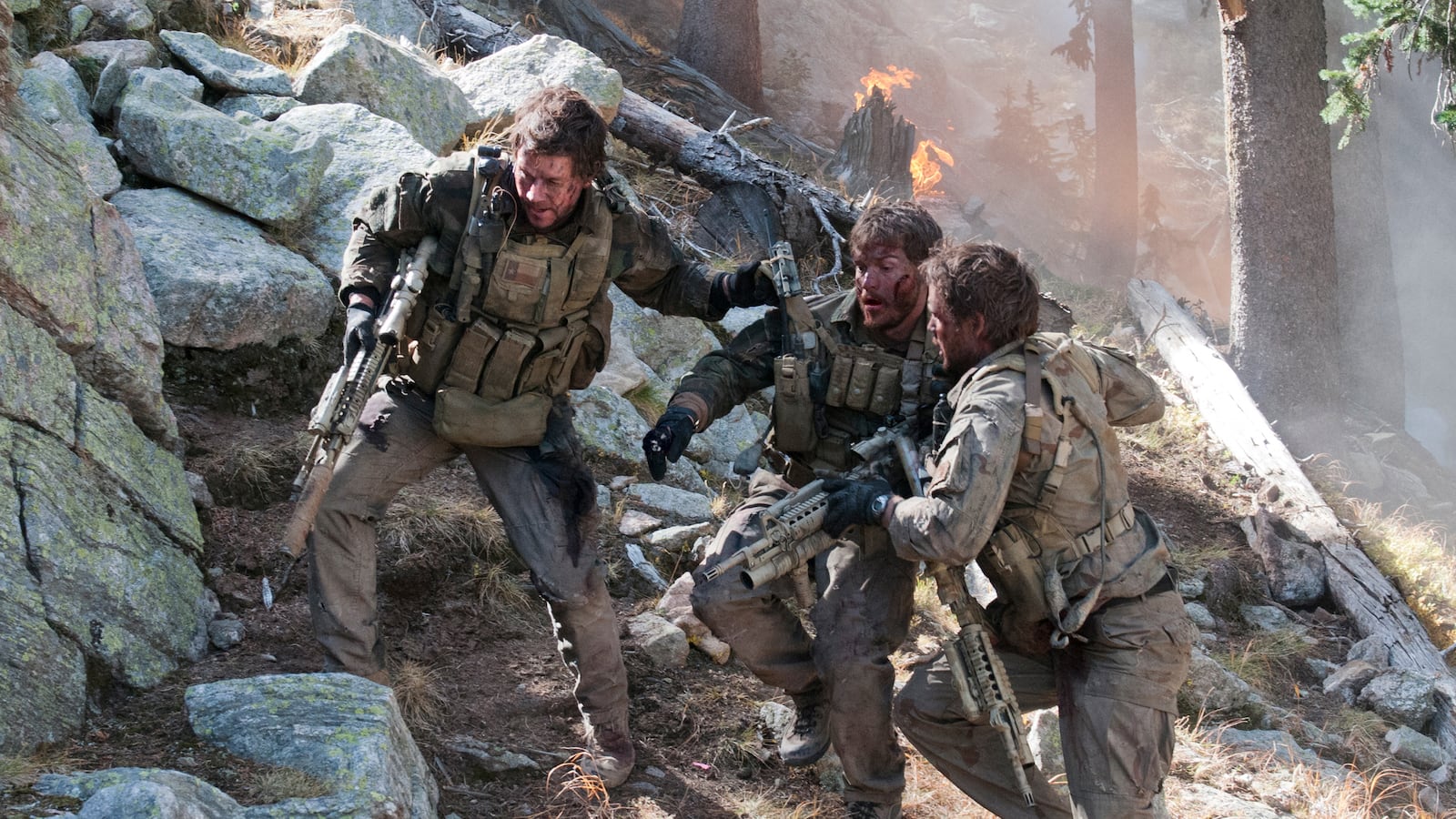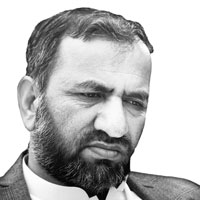Nearly eight-and-a-half years after Mohammad Gulab and his fellow villagers harbored and saved the life of a gravely wounded U.S. Navy SEAL, they say they are still proud of their courageous action and would do it again in spite of the disappointments and troubles that have followed. In the face of point-blank Taliban threats to overrun the small village of Sabray in remote Kunar Province, along the porous and mountainous frontier with Pakistan, the villagers bravely protected, gave first aid to, fed, and clothed Marcus Luttrell, the wounded Special Warfare Operator, the only survivor of a four-man SEAL patrol. A village elder even secretly carried a note hidden inside his clothing—written by Luttrell and indicating the exact spot where he could be rescued—through Taliban lines at great personal danger. “I have no regrets for what my family, my fellow villagers and I have done,” Gulab tells the Daily Beast. “We knew what the Taliban’s reaction would be from the day we carried him in our door.”

The Taliban have made no secret that Gulab, his family and other villagers who assisted Luttrell remain marked men. “The person Gulab is exiled forever from the day he left his village with the wounded U.S. soldier,” the local Taliban commander, Qari Moued Safi, tells the Daily Beast. “He remains a target and one day soon he will face death.” Safi makes the same threat toward other villagers and warns them never again to help a wounded “infidel” soldier. “The Taliban hate our small village of 60 homes and families,” says Sabray villager Muhammad Jan, 45. “They call us the village that protects infidel U.S. soldiers.”
Soon after he saved Luttrell, Gulab was forced to abandon his home, his possessions and even his pickup truck due to Taliban death threats. Insurgents burned down his little lumber business in Sabray. He and his wife and their six children at the time moved in with his brother-in-law near the U.S. base at Asadabad, the provincial capital. He is now in the U.S., living in California with his 10 kids, assisted by Luttrell, the publishers of his 2012 book titled Lone Survivor, and the producers of the movie of the same name, starring Mark Wahlberg, that is due to be released at the end of the year. Gulab says the actor who plays him in the film bears a striking resemblance to him. At the end of the movie, he proudly says, his photograph will be shown as part of the credits. He says he hopes to receive some seven percent of the book’s revenues but does not know if he will get any film royalties. Gulab is even working on his own book about the incident with the assistance of Patrick Robinson, the co-author of Luttrell’s book. But Gulab sadly tells The Daily Beast that in the face of the continuing Taliban threats he is unlikely ever to be able to return to his still threatened village.
Gulab and the other villagers insist that they saved Luttrell out of obedience to the ages-old ethnic-Pashtun tradition known as Pashtunwali. That ancient code obliges Pashtuns to help and protect anyone in need, friend or enemy. “We did not rescue Marcus for money or privileges,” Gulab says. “By rescuing and keeping him safe for five nights in our home we were only doing our cultural obligation.” Insurgent commander Safi doesn’t buy the villagers’ Pashtunwali defense. “Pashtunwali does not extend to helping oppressors and infidel aggressors such as that American soldier who is an enemy of Islam,” he says.
Sabray’s villagers strongly disagree. Jan, who helped Gulab care for Luttrell, even rather hyperbolically equates what Gulab did to Mullah Mohammad Omar’s refusal to hand over Osama bin Laden to the U.S. even at the cost of his Islamic regime and a great loss of Afghan lives. “They both gambled with people’s lives in the name of Pashtunwali,” says Jan, 45. “Omar sacrificed his regime while Gulab put his, his family’s and his villagers’ lives at risk by proudly giving a safe haven to the wounded U.S. soldier.”
While that may be an over-the-top and erroneous comparison, it shows how steadfast the villagers are in feeling that they did the right thing. Jan says most other villagers in the region agree. “Our village is now very famous,” says Jan. “Some villagers in the area call us traitors. But most praise us for being correct and honorable.” Jan, who helped care for Luttrell, never thought the injured SEAL would survive. “When I first saw this frightened soldier I never thought he would make his way out of Gulab’s house alive,” Jan recalls. “I could not find hope in his eyes which were tired and hopeless. His skin was dry. But I was wrong.”
While feeling satisfied by the correctness of their actions, the villagers still living in and around the poor, sheepherding and woodcutting hamlet say they are deeply disappointed by the U.S. military’s behavior and its broken promises in the wake of their saving Luttrell. Within one year of their rescuing the SEAL, the U.S. military jailed Gulab for several days, as well as the octogenarian village chief of Sabray who carried Luttrell’s note for four months. Both say they have no idea why they were incarcerated. “For our bravery and hospitality the U.S. put Gulab and our elderly Shina Malak (village chief) in jail,” complains Jan. But now the villagers are more concerned about the future which they view with a mixture of anxiety and trepidation, being keenly aware of the impending U.S. military’s withdrawal from the beleaguered frontier region and from Afghanistan at the end of next year. As a result they are far from hopeful about the future. “I worry that after 2014 things may dramatically change for the worse,” say Gulab’s 17-year-old son, Gul Muhammad, a high-school student in Asadabad.
The villagers say the U.S. Provincial Reconstruction Team at Asadabad promised to reward the villagers by building a boys’ and girls’ school, a seven kilometer road, an irrigation and drinking water system and installing an electrical generator. “They never fulfilled the commitment they made,” Gulab says. The school is nothing more than a circle of rocks and stones and a tarp placed on the ground on which the students sit. The villagers derisively call it a “ghost school.” There is a government paid teacher. But the constant rain and the cold mountain weather usually prevent the students from gathering outdoors to learn. There is no road, irrigation or electricity. There are some water pipes but they are usually dry.
The villagers also complain that there’s no security except that provided by their own village forces. “In our area we protect ourselves with our own guns and strength,” says Jan. “There is no government, no Americans and no Taliban because we keep them away.” “Only big group of 200 Taliban can attack us,” Jan adds. “But small Taliban groups like we have here are no more dangerous than jackals. They can’t bother us.” He says the villagers are on a round-the-clock alert for the Taliban. Gulab’s son Gul Muhammad remembers that the village was under constant threat from the day Luttrell was rescued. “Even young people like me had to stand guard with a gun the whole night,” recalls the 17-year-old, 10th grader, wearing a brown shalwar kameez and white sports shoes, who goes to school in Asadabad. “But gradually the village became more secure.”
While there are no U.S. forces on the ground protecting the village, Muhammad is thankful for the occasional U.S. armed drone attacks, which are preventing the insurgents from massing in numbers large enough to harm to the village. But he, like most other villagers, worries about the U.S. withdrawal. “Everyone is worried about what will happen after the U.S. forces leave,” says Muhammad. “I only hope that my school will not be closed and the Taliban will not be able to attack our village and this small city.” Even today in the relative calm of Asadabad, he is concerned for his safety. “In my school lots of students have doubts about me and my family because we protected Marcus,” Muhammad says. “Even here in Asadabad I do not feel very secure. I’m constantly changing my route when I travel and do not go to risky areas.” He misses his home in Sabray but knows he cannot return. “I miss my beautiful village and my valley, but my family and I cannot return because of the Taliban threats,” he says. “Our village is still a top target.”
Villager Jan is not optimistic about the future either. “When the U.S. leaves, the Taliban will get ‘red eyes,’” says Jan using a Pashtun metaphor for becoming more aggressive. “Right now we are only being saved by the drones which are killing lots of Taliban.” Gulab echoes Jan’s fears. He believes the U.S. troop drawdown will allow the insurgents more freedom of movement and therefore give them more strength. “The moment the U.S. leaves Afghanistan the Taliban will definitely get stronger and more dangerous,” Gulab says.
No one seems to place much hope in next April’s presidential election. Most villagers are reconciled to the reality that insecurity will not allow them to cast a ballot, which may be the case throughout much of the Taliban-influenced south and east. Jan says the last time he tried to vote was in the 2009 presidential election but was prevented by widespread insecurity. “Our village is in the mountains and that election day the Taliban laid siege to the whole area so we couldn’t vote,” Jan recalls. “If security doesn’t improve soon, next year will be the same.” Gulab’s son Muhammad believes the provincial capital of Asadabad will be secure enough for him to vote next April. “I’ll definitely go vote for my favorite candidates,” he says, “though I doubt the election will make a difference.”
If there’s anything the Sabray villagers can agree upon it’s their hatred of the Taliban. “The Taliban interrupted the lives of the people and we are fed up with them,” Muhammad says. But he and many other Afghans seem less than confident that the Taliban can be kept at bay for long after the U.S. exodus.







